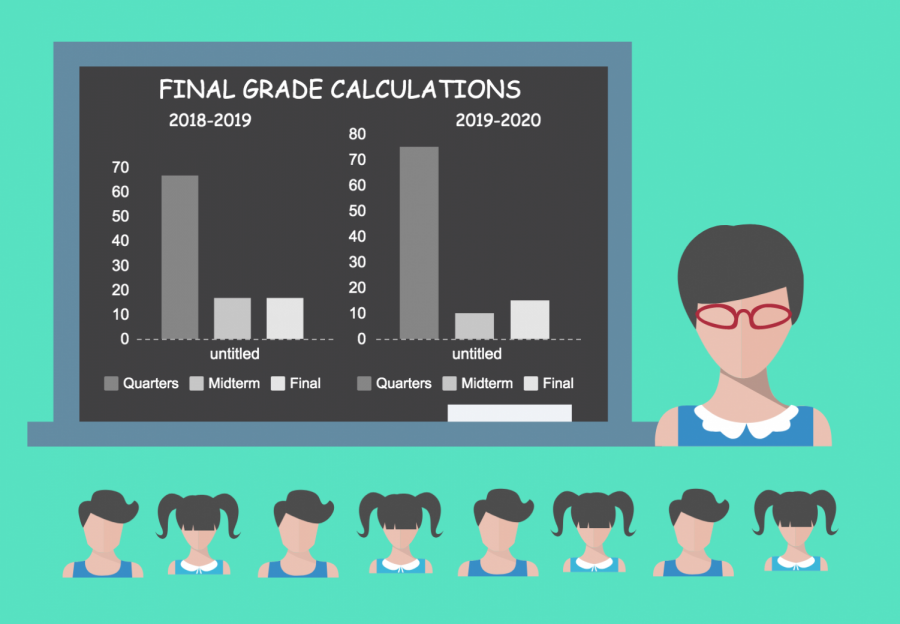New grading policy to be instituted in the 2019-2020 school year
Midterm and final exam grades will be reduced to 25 percent of a final average
Midterm and final exam grades will go from being a little over 33 percent of a final average to 25 percent in the upcoming school year. Quarter grades will rise accordingly.
June 2, 2019
By Fynn Haughney
The grading policy is set to change in the 2019-2020 school year following a unanimous vote by board members that will see percentages for both the midterm and the final decrease, while the weight of the four quarters will climb.
The most significant drop will be seen in the weight of the midterm, which will go from 16.67 percent of the yearly grade to 10 percent. The final, which has historically been equivalent in weight to the midterm and the four quarters, will now be worth 15 percent of the final grade, while the four quarters will see an increase to 18.75 percent each.
The change comes after examining the “unpredictability that accompanies the scales assigned to the Common Core Regents Exams, weighting comparisons to other school districts, and the potential impact of Regents Exams on the college admissions process,” according to Dr. Steven Maloney, assistant superintendent of curriculum.
The board’s reason to consider changing the grade weighting calculation was due, in part, to the June 2017 Common Core Geometry Regents, which had at least three flawed questions out of a 36-problem exam, according to the Long Island Herald.
“A two-month quarter grade should weigh more than a two-hour final or midterm,” said Julia Carpenter, sophomore. “The amount of homework, projects and test grades that go into one quarter completely outweighs a final exam.
The decision was reached after reviewing other school districts’ grading policies, analyzing over 10,000 Bay Shore student data points, and conducting a grade calculation study handled by an outside statistician, according to district reports.
“We spend so much time studying and going over our work and if the midterm is going to be just ten percent of the grade, what’s the point in taking them?” said Hailey Darsoo, freshman. “If you get a 100, it’s not fair because it will only be worth one-tenth of your grade. It’s also not fair to the teachers who work so hard to help us learn.”
Teachers were evenly split over the change, according to survey results conducted by the teachers’ union that were presented to the board before its final decision in January. The board had delayed its original vote on the matter to allow for teacher feedback.
“Many of the students complain about how unfair it is for the exams to count for such a high percentage, but when pressed will admit that they don’t spend much time actually preparing for those exams,” said a teacher who asked to remain anonymous. “Removing or diminishing an obstacle because it is difficult does not adequately prepare them for the challenges they will face in life.”
Schools across Long Island have been re-examining their yearly grade calculation. The Lynbrook School District implemented a system this school year where each quarter counts for 22.5 percent of a student’s final grade, and a Regents or final exam 10 percent, according to the Long Island Herald. There are no midterms calculated into the final average.
“I like how [Lynbrook] doesn’t have midterms and just raise their quarter grades,” said Hannah Borge, junior. “If you mess up a midterm and a quarter grade, it really messes up your final grade, but if you just mess up a quarter grade, it gives you a chance to redeem yourself.”
Nationwide, schools are reconsidering their grading policies, due, in part, to the push for increased testing that came with the Common Core. High schools in Montgomery County, Maryland, dropped final exams altogether and rely only on quarter grades to calculate GPAs, according to The Washington Post. Lynbrook instituted a similar move with a “Do No Harm” rule under which a Regents score was not calculated as part of a student’s final grade unless it boosted the final averages. When an exam score hurt the final average, each quarter counted for 25 percent; if a final exam helped, each quarter counted for 20 percent. Lynbrook dropped “Do No Harm” for this school year.
“I think it is reasonable to expect students to prove they have mastered a skill by passing an exam,” said another anonymous teacher. “If our goal is to get students college and career ready, they need to take tests, learn study skills and feel the impact of their grades. Colleges don’t say, ‘we’ll only count the final if it helps you’ and civil service exams aren’t ignored when applying for jobs.”
Here, the board considered a similar move when it discussed a “hold harmless” element to grade calculation – Regents scores would not have been considered part of students’ final course grades unless they boosted final averages. Board minutes show members Lou Bettinelli and Andrew Arcuri were opposed the idea and Vice President Susan Gargan declined to add the item to the motion the board ultimately voted on.
“The Board of Education’s intent was to never negatively impact the students,” said Maloney.
The new grading percentiles will be implemented in the 2019-2020 school year, and letters will be sent home to parents and students before the first day of school.

